| Listing 1 - 10 of 23 | << page >> |
Sort by
|
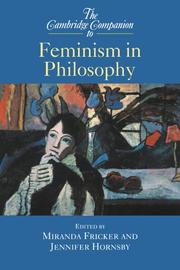
ISBN: 052162469X 0521624517 9780521624510 9780521624695 9781139000307 Year: 2004 Volume: *22 Publisher: Cambridge Cambridge University Press
Abstract | Keywords | Export | Availability | Bookmark
 Loading...
Loading...Choose an application
- Reference Manager
- EndNote
- RefWorks (Direct export to RefWorks)
These essays are written by philosophers at the forefront of feminist scholarship, and are designed to provide an accessible guide to this philosophical literature. They range from history of philosophy through metaphysics to philosophy of science.
Feminist theory. --- Feminism --- Féminisme --- Filosofie. --- Feminisme. --- Feminismo (filosofiaaspectos psicológicos) --- Théorie féministe. --- Féminisme dans la philosophie. --- Philosophy. --- Philosophie. --- Feminismo (filosofiaaspectos psicológicos). --- Sociology of the family. Sociology of sexuality --- Philosophy --- Feminismo (filosofia;aspectos psicológicos).
Periodical
ISSN: 2620181X 14512203
Abstract | Keywords | Export | Availability | Bookmark
 Loading...
Loading...Choose an application
- Reference Manager
- EndNote
- RefWorks (Direct export to RefWorks)
Feminist theory --- Feminism --- Feminist philosophy --- Feminist sociology --- Theory of feminism --- Philosophy --- feminist theory --- gender studies --- cultural studies --- women's studies --- Arts and Humanities --- Social Sciences --- Human Rights, Women's Studies & Child Welfare --- Gender Studies --- Théorie féministe --- Féminisme --- Feminism. --- Feminist theory.
Book

ISSN: 19580975 ISBN: 9782709918831 2709918838 2709918846 Year: 2016 Publisher: Marseille : IRD Éditions,
Abstract | Keywords | Export | Availability | Bookmark
 Loading...
Loading...Choose an application
- Reference Manager
- EndNote
- RefWorks (Direct export to RefWorks)
Ignorée, invisible, la question du genre reste cachée sous le développement. Et pourtant, comprendre le développement n’est pas possible sans une perspective de genre. Cet ouvrage, didactique, montre en quoi et comment le concept de genre permet de revisiter les études de développement. Le genre permet de comprendre la construction historique, sociale et culturelle des différences et des inégalités. Il offre des outils pour une analyse critique du système capitaliste globalisé. Le genre, inscrit dans le féminisme, permet aux catégories dominées et marginalisées, en particulier les femmes mais pas seulement, de faire entendre leurs voix. Dans le contexte actuel de crise globale et d’accroissement des inégalités, il propose des pistes pour renouveler la pensée sur le développement, mais aussi pour agir autrement. Combinant diverses disciplines et thématiques, cet ouvrage montre que la portée heuristique du genre ne se limite pas aux domaines habituellement considérés comme féminins (l’éducation, la famille, le social, la santé de la reproduction, etc.) mais s’étend à tous les domaines (le politique, le droit, la sécurité, la diplomatie, l'économie, etc.). Ce livre met aussi en évidence la diversité et l’enrichissement mutuel des diverses traditions de recherche entre le monde francophone, anglophone et hispanophone. Il s’adresse particulièrement aux étudiant-es, chercheur-es et enseignant-es, militant-es, chargé-es de programme dans des organisations de coopération et représentant-es des pouvoirs publics au Nord et au Sud.
Gender identity --- Feminism --- Women in development --- Feminist economics --- Identité sexuelle --- Féminisme --- Femmes dans le développement --- Economie féministe --- Women in rural development --- Sex role --- Sexual division of labor --- Rôle selon le sexe au travail --- Études sur le genre --- Théorie féministe --- Économie féministe --- Développement --- Sociologie --- Identité sexuelle --- Féminisme --- Femmes dans le développement --- Economie féministe --- Gender identity. --- Rôle selon le sexe au travail. --- Études sur le genre. --- Théorie féministe. --- Économie féministe. --- Femmes dans le développement. --- Sociologie. --- Rôle selon le sexe au travail. --- Études sur le genre. --- Théorie féministe. --- Économie féministe. --- Femmes dans le développement. --- Développement --- Women's Studies --- Economics (General) --- travail --- femmes --- genre --- économie --- développement
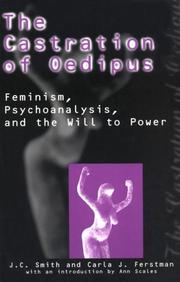
ISBN: 0814780180 0814780199 0814788947 Year: 1996 Publisher: New York, NY : New York University Press,
Abstract | Keywords | Export | Availability | Bookmark
 Loading...
Loading...Choose an application
- Reference Manager
- EndNote
- RefWorks (Direct export to RefWorks)
The intellectual movements of psychoanalysis, postmodernism, and feminism have redefined the ways in which we think about human experience. And yet, an integration of these movements has been elusive, if not impossible. In this landmark book, J.C. Smith and Carla J. Ferstman combine these disparate traditions to create a provocative, unified, and tightly woven perspective that transcends the misogyny implicit in much of Freudian psychoanalytic theory. The dialectics of domination and submission are central to Smith and Ferstman's argument. Men and women, they insist, must avoid the temptation to fetishize equality and recognize the roles of domination and submission in the human psyche, or, in Nietzsche's terms, the Will to Power. They argue that the unification of psychoanalysis, postmodernism, and feminism leads us to a shocking conclusion--that women and men cannot move beyond the suffering which so haunts the human condition, unless heterosexual men surrender the power that is causing their misery and affirm life by joyfully accepting domination by women. And women, conversely, must reaffirm their power by rejecting Oedipal genderization and embracing a liberating matriarchal consciousness and a matriphallic sexuality. A work of tremendous insight and extraordinary intellectual energy, The Castration of Oedipus will provoke strong reactions in all readers regardless of ideology.
Feminist theory. --- Postmodernism. --- Psychoanalysis and feminism. --- Feminism--Philosophy --- Feminist sociology --- Feminist theory --- Feministische theorie --- Filosofie van het postmodernisme --- Philosophie postmoderniste --- Postmodernism --- Postmodernisme --- Postmodernisme (esthétique) --- Postmodernisme (filosofie) --- Postmodernisme (philosophie) --- Psychanalyse et féminisme --- Psychoanalyse en feminisme --- Psychoanalysis and feminism --- Theory of feminism --- Théorie féministe --- Feminism and psychoanalysis --- Feminism --- Feminist philosophy --- Post-modernism --- Postmodernism (Philosophy) --- Arts, Modern --- Avant-garde (Aesthetics) --- Modernism (Art) --- Philosophy, Modern --- Post-postmodernism --- Philosophy
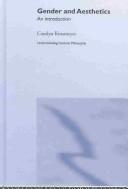
ISBN: 1299140203 0415266580 1134500475 1280025344 0203646630 9780203646632 9780415266581 9780415266598 0415266599 9786610025343 6610025347 0415266599 9781134500475 9781134500420 1134500424 9781134500468 1134500467 Year: 2004 Publisher: New York, N.Y. Routledge
Abstract | Keywords | Export | Availability | Bookmark
 Loading...
Loading...Choose an application
- Reference Manager
- EndNote
- RefWorks (Direct export to RefWorks)
Feminist approaches to art are extremely influential and widely studied across a variety of disciplines, including art theory, cultural and visual studies, and philosophy. Gender and Aesthetics is an introduction to the major theories and thinkers within art and aesthetics from a philosophical perspective, carefully introducing and examining the role that gender plays in forming ideas about art. It is ideal for anyone coming to the topic for the first time. Organised thematically, the book introduces in clear language the most important topics within feminist aesthetics: * Why were there so
Feminism and art. --- Women in art. --- Feminist theory. --- Arts --- Féminisme et art. --- Femmes dans l'art. --- Théorie féministe. --- Feminism --- Feminist philosophy --- Feminist sociology --- Theory of feminism --- Art and feminism --- Art --- Philosophy. --- Philosophie. --- Philosophy --- Feminism and art --- Feminist theory --- Women in art --- Political philosophy. Social philosophy --- Aesthetics --- Sociology of the family. Sociology of sexuality --- Gender --- Theory --- Book --- Feminisme et art. --- Theorie feministe.
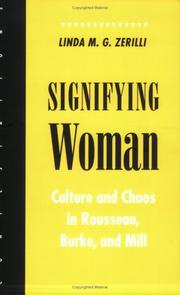
ISBN: 0801481775 0801429587 1501711318 Year: 2018 Volume: *2 Publisher: Ithaca, NY : Cornell University Press,
Abstract | Keywords | Export | Availability | Bookmark
 Loading...
Loading...Choose an application
- Reference Manager
- EndNote
- RefWorks (Direct export to RefWorks)
Woman has been defined in classic political theory as elusive yet dangerous, by her nature fundamentally destructive to public life. In the view of Linda M. G. Zerilli, however, gender relations shape the very grammar of citizenship. In deeply textured interpretations of Rousseau, Burke, and Mill, Zerilli recasts our understanding of woman as the agent of social chaos and makes a major advance for feminist political theory.
Feminism--Philosophy --- Feminist sociology --- Feminist theory --- Feministische theorie --- Femmes dans la vie publique --- Theory of feminism --- Théorie féministe --- Vrouwen in het openbare leven --- Women in public life --- Feminist theory. --- Political science --- Women in public life. --- Science politique --- Political aspects. --- History. --- Aspect politique --- Histoire --- Rousseau, Jean-Jacques, --- Burke, Edmund, --- Mill, John Stuart, --- Théorie féministe --- History --- Political aspects --- Burke, Edmund --- Mill, John Stuart --- Feminist theory - Political aspects. --- Feminism --- Feminist philosophy --- State, The --- Philosophy --- History of theories
Book
ISBN: 2707306800 9782707306807 Year: 1997 Publisher: Paris Minuit
Abstract | Keywords | Export | Availability | Bookmark
 Loading...
Loading...Choose an application
- Reference Manager
- EndNote
- RefWorks (Direct export to RefWorks)
L’homme et la femme demeurent plus étrangers l’un à l’autre que ne le ont à chacun l’animal, la plante, la pierre, l’univers, les dieux. Cet irréductible de l’un à l’autre s’oublie sans cesse et s’organise en mondes bâtis dans la méconnaissance. Le langage, les échanges en général fonctionnent comme si ces deux moitiés du monde se connaissaient, se parlaient, se partageaient. À peine se font-elles signe de chaque côté d’un miroir qui n’appartient ni à l’une ni à l’autre, d’un abîme infernal ou céleste, d’une proximité que plus rien ne signifie. À moins qu’elles ne se détournent délibérément l’une de l’autre, ou ne tentent de se détruire dans le vertige de quelque renversement dialectique.Ni la femme ni l’homme n’ont construit un territoire qui leur permette d’habiter et cohabiter leur corps, leur chair, de s’étreindre, s’aimer, créer ensemble. Mais la constitution d’une éthique sexuée est toujours reportée à plus tard. Elle emprunte d’étranges détours. S’arrête à l’écologie animale, considère le sexe des végétaux, analyse le comportement de nos cellules, s’efforce de connaître toutes espèces ou genres de mêmes et d’autres selon la taille, la forme, la couleur, la quantité, le nombre... Tout, sauf ce si proche de nous que nous ne le percevons pas et que, le touchant, nous n’abordons souvent qu’à notre nuit. Tant nous fait défaut ce qui dit nos puissances sensibles, leur architecture, leurs abords, leurs seuils, leurs passages du plus intime au plus lointain, en nous, entre nous.La différence sexuelle comme enjeu théorique et pratique est encore abandonnée aux sciences et techniques “ secondes ” : médecines, arts, modes. Restaurations, reproductions, voiles, masques d’un original qui reste dans l’ombre, et qui vaut d’être interrogé avant d’être imputé à Dieu, ou quelque Autre qui nous fait loi.Qui suis-je ? Qui es-tu ? En quoi consiste l’insurmontable de notre différence ? Quelles sont nos conditions de possibilité de vie, de beauté, de raison commune ? Ces questions s’imposent à notre époque. Mais elles suscitent les polémiques et les refus de qui se veut, se croit, ou s’ignore monopole d’une “ philosophie première ” – Vérité.
Developmental psychology --- Sociology of the family. Sociology of sexuality --- Philosophy --- Sexual ethics. --- Feminist theory. --- Philosophy. --- Sexual ethics --- Feminist theory --- Filosofie --- Ontwikkelingspsychologie --- Sociologie van het gezin. Sociologie van de seksualiteit --- Sex --- Sex ethics --- Sexual behavior, Ethics of --- Mental philosophy --- Feminism --- Feminist philosophy --- Feminist sociology --- Theory of feminism --- Moral and ethical aspects --- Ethics --- Humanities --- Identity --- Love --- Book --- Sex differences --- Sex (Psychology) --- Sex differences (Psychology) --- Morale sexuelle --- Théorie féministe --- Philosophie --- Sexualité (Psychologie) --- Différences entre sexes (psychologie)
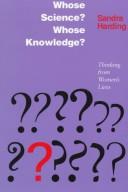
ISBN: 0801425131 0801497469 1501712950 1501712942 9781501712951 9780801425134 9780801497469 9781501712944 Year: 2016 Publisher: Ithaca, NY
Abstract | Keywords | Export | Availability | Bookmark
 Loading...
Loading...Choose an application
- Reference Manager
- EndNote
- RefWorks (Direct export to RefWorks)
Sandra Harding here develops further the themes first addressed in her widely influential book, The Science Question in Feminism, and conducts a compelling analysis of feminist theories on the philosophical problem of how we know what we know. Following a strong narrative line, Harding sets out her arguments in highly readable prose. In Part 1, she discusses issues that will interest anyone concerned with the social bases of scientific knowledge. In Part 2, she modifies some of her views and then pursues the many issues raised by the feminist position which holds that women's social experience provides a unique vantage point for discovering masculine bias and questioning conventional claims about nature and social life. In Part 3, Harding looks at the insights that people of color, male feminists, lesbians, and others can bring to these controversies, and concludes by outlining a feminist approach to science in which these insights are central. "Women and men cannot understand or explain the world we live in or the real choices we have," she writes, "as long as the sciences describe and explain the world primarily from the perspectives of the lives of the dominant groups." Harding's is a richly informed, radical voice that boldly confronts issues of crucial importance to the future of many academic disciplines. Her book will amply reward readers looking to achieve a more fruitful understanding of the relations between feminism, science, and social life.
Feminist theory --- Knowledge, Theory of --- Science --- Women in science --- Théorie féministe --- Théorie de la connaissance --- Sciences --- Femmes dans les sciences --- Social aspects --- Aspect social --- Women in science. --- Feminist theory. --- Knowledge, Theory of. --- Epistemology --- Theory of knowledge --- Feminism --- Feminist philosophy --- Feminist sociology --- Theory of feminism --- Science and society --- Sociology of science --- Social aspects. --- Philosophy --- Psychology --- Minorities in science --- Femmes dans les sciences. --- Théorie féministe. --- Théorie de la connaissance. --- Sciences et société.
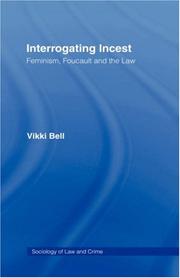
ISBN: 0415101042 0415079519 0203410181 9780203410189 1134896530 9781134896530 128032242X 9781280322426 1134896522 9781134896486 9781134896523 9780415079518 9780415101042 Year: 1993 Volume: *7 Publisher: London Routledge
Abstract | Keywords | Export | Availability | Bookmark
 Loading...
Loading...Choose an application
- Reference Manager
- EndNote
- RefWorks (Direct export to RefWorks)
Winner of British Sociological Association Philip Abrams Memorial Prize 1993 Within feminism incest has often been subsumed under a discussion of sexual violence and abuse. Yet, important as this is, there has been little account of how feminist work itself relates to other ways of talking about and understanding incest.In Interrogating Incest Vikki Bell focuses on the issue of incest and its place in sociological theory, feminist theory and criminal law. By examining incest from a critical Foucauldian framework she considers how feminist discourse on incest itself fits into exist
Criminal law. Criminal procedure --- Developmental psychology --- Sociology of the family. Sociology of sexuality --- Foucault, Michel --- Feminist theory. --- Incest. --- Sex crimes. --- Abus sexuels --- Abuse [Sexual ] --- Agression sexuelle --- Agressions sexuelles --- Amour incestueux --- Crimes sexuels --- Délinquance sexuelle --- Délits sexuels --- Feminism--Philosophy --- Feminist sociology --- Feminist theory --- Feministische theorie --- Incest --- Inceste --- Infractions sexuelles --- Seksuele delicten --- Seksuele misdrijven --- Sex crimes --- Sex offenses --- Sexual abuse --- Sexual crimes --- Sexual deliquency --- Sexual offenses --- Theory of feminism --- Théorie féministe --- Violence sexuelle --- Foucault, Michel. --- Abuse, Sexual --- Sexual delinquency --- Sexual violence --- Crime --- Prostitution --- Feminism --- Feminist philosophy --- Sexual intercourse --- Consanguinity --- Philosophy --- Foucault, Michel, --- Fūkūh, Mīshīl, --- Foucault, Michael, --- Fuko, Mišel, --- Pʻukʻo, --- Pʻukʻo, Misyel, --- Phoukō, Misel, --- Fuke --- 福柯 --- Fuḳo, Mishel,
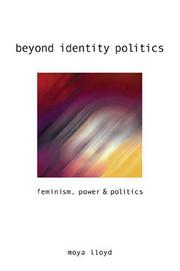
ISBN: 0803978855 0803978847 1446221911 1281251488 9786611251482 1847871402 9781847871404 9780803978843 9780803978850 9781446221914 9781281251480 6611251480 Year: 2005 Publisher: London Sage
Abstract | Keywords | Export | Availability | Bookmark
 Loading...
Loading...Choose an application
- Reference Manager
- EndNote
- RefWorks (Direct export to RefWorks)
This book engages with key contemporary issues such as difference, identity and subjectivity, and their relation to power and politics. Moya Lloyd explores feminist conceptions of power, patriarchy, agency, critique and the political relating to subjectivity.
Feminist theory. --- Difference (Philosophy) --- Théorie féministe --- Différence (Philosophie) --- Difference (Philosophy). --- Political science. --- Power (Social sciences). --- Feminist theory --- Power (Social sciences) --- Identity politics --- Gender & Ethnic Studies --- Social Sciences --- Gender Studies & Sexuality --- #SBIB:316.346H10 --- Vrouwenproblematiek, feminisme: algemeen --- Geografie --- Sociale geografie --- Politieke Geografie. --- Théorie féministe --- Différence (Philosophie) --- Empowerment (Social sciences) --- Political power --- Feminism --- Feminist philosophy --- Feminist sociology --- Theory of feminism --- Philosophy --- Philosophy and psychology of culture --- Developmental psychology --- Politics --- Sociology of the family. Sociology of sexuality --- Exchange theory (Sociology) --- Political science --- Social sciences --- Sociology --- Consensus (Social sciences) --- Identity (Psychology) --- Politics of identity --- Political aspects --- Political participation --- Essentialism --- Gender --- Identity --- Power --- Postmodernism --- Theory --- Book
| Listing 1 - 10 of 23 | << page >> |
Sort by
|

 Search
Search Feedback
Feedback About UniCat
About UniCat  Help
Help News
News